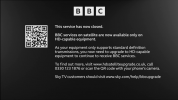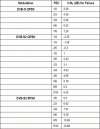UK Timeline of changes to Freeview and Satellite TV
===================================================
Q1 2024
BBC SD channels close on satellite; Viewers who haven’t upgraded their satellite equipment to HD
compatible receivers will lose BBC TV channels and radio stations.
2024
BBC Four, CBBC, Radio 4 Extra to close; The channels are due to continue online within the BBC
iPlayer / BBC Sounds. The BBC disagrees with the concept of the channels being “closed”, but BBC
Three’s online-only stint involved the channel becoming a half-hearted sub-branded area of the
iPlayer, which for many users didn’t feel like a channel, just a header to unite certain types of
content.
1st January 2025
ITV1/STV (Channel 3) and Channel 5 licence renewal; Ofcom will shortly begin the renewal process
that will come into effect at the beginning of 2025. During the process, Ofcom will determine the
levels of regional programmes to be shown on Channel 3 and how much news or children’s
programmes should be shown on Channel 5 among other things. Renewal is not guaranteed: for
example, if ITV refused renewal, it could continue as an entirely commercial broadcaster on a
different channel number.
2025
Ofcom reviews digital terrestrial TV (Freeview) future; The Department for Digital, Culture, Media,
and Sport (DCMS) has tasked Ofcom to complete a review on digital terrestrial television by this
point. No doubt it will be heavily influenced by the outcome of the WRC-23 and its decision on
frequency usage. It’s the earliest point Ofcom can serve a five-year notice period on Freeview
multiplex licence holders if it’s decided terrestrial TV must close. That would result in terrestrial TV
as we know it ending in 2030. If terrestrial TV survives longer, Ofcom will still need to make key
decisions regarding an IP-switchover for when digital terrestrial TV in its current form is terminated.
2026
BBC-B (PSB3) Freeview multiplex licence expires; The BBC has two Freeview multiplexes – one linked
to the Royal Charter (BBC-A/PSB1) and is used for SD channels, and a second – BBC-B/PSB3 – for HD
channels. In 2026, the BBC-B licence expires. But the BBC has indicated to the DCMS it won’t decide
on renewing it yet. Depending on Ofcom’s review of Freeview and the future of the BBC beyond the
end of the Royal Charter, the closure of BBC-B could be used as an opportunity to close SD channels,
migrating BBC HD channels to BBC-A.
31st December 2027
BBC Royal Charter expires; The Government and BBC are exploring new methods to fund the BBC.
2028
Earliest date for Sky satellite service closure; Sky’s contract with satellite operator SES expires in
2028. Renewed in May 2022, the contract covers the use of transponders at the orbital position
28.2/5°E and builds upon previous contacts Sky has signed with SES that run until 2027. Sky may
sign extensions between now and then, but Sky’s recent push to promote its internet-based TV
service clearly shows change is coming. The BBC, ITV, Channels 4 and 5 have their own contracts
with SES, so technically the main free-to-air broadcasters could continue offering a core, universal TV
service beyond Sky’s departure, although the economics of providing a service to Freesat users only
might be unviable.
2030
Earliest digital terrestrial TV/Freeview closure date; If WRC-23 decides Freeview frequencies should
be cleared for mobile services, then digital terrestrial television services will need to wind down
from 2030.
2034
Current expiry for digital terrestrial multiplex licenses; The current preferred end date for digital
terrestrial television, when multiplex licences expire. By this point, viewers will need to migrate to
internet-based TV platforms.…but there will need to be a universal, affordable, reliable internetbased
TV service for viewers to switch to, something that BBC Director-General Tim Davie has
recently raised.



